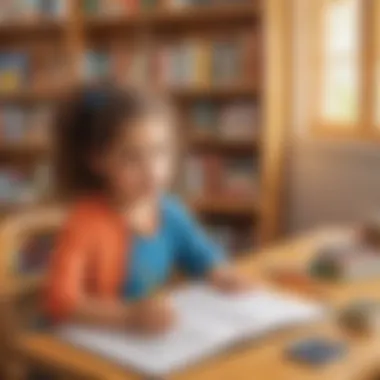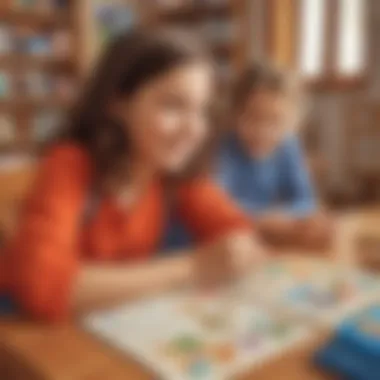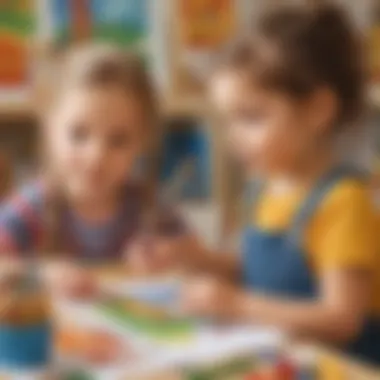Unlocking the Potential: Proven Strategies to Engage Kindergarteners


Fun Activities Ideas
Engaging kindergarteners in fun activities is essential for their overall development. Here are some creative ideas to keep them entertained and learning:
- Indoor Activities: Set up a sensory bin with different textures for tactile exploration. Create a mini indoor gardening station to teach kids about plants.
- Outdoor Adventures: Take nature walks to observe different plants and animals. Encourage imaginative play in a backyard obstacle course.
- Arts and Crafts: Make collages using recyclable materials or try finger painting sessions. Build simple origami creations to enhance fine motor skills.
- Science Experiments: Conduct easy experiments like making a volcano with baking soda and vinegar. Explore surface tension by creating floating paper boats.
- Cooking and Baking: Involve kids in kitchen tasks like mixing ingredients for cookies. Teach measuring skills while making simple snacks.
Educational Games
Incorporating educational games into your kindergartener's routine can make learning enjoyable. Here are some ideas to enhance their skills:
- Math and Logic Games: Use counting cards for a math scavenger hunt or try shape-sorting puzzles. Play Sudoku for logical thinking.
- Language and Vocabulary Games: Use flashcards for sight words or play word association games. Read aloud and discuss stories to build vocabulary.
- STEM Activities: Build simple structures with building blocks or create ramps for toy cars to explore engineering concepts.
- History and Geography Puzzles: Puzzle maps can help children learn about different countries. Use history-based memory games to make learning interactive.
- Interactive Learning Apps: Explore apps that offer interactive storytelling or math challenges. Look for age-appropriate apps that engage and educate.
Seasonal and Holiday Activities
Celebrate holidays and seasons with themed activities that promote creativity and learning:
- Valentine's Day Crafts: Make heart-shaped cards or create DIY photo frames.
- Halloween Costume Ideas: Design costumes together and explore spooky crafts.
- Thanksgiving Cooking Projects: Involve kids in preparing simple Thanksgiving recipes.
- Christmas Decorations: Create handmade ornaments or decorate gingerbread houses.
- New Year's Resolutions for Kids: Reflect on the past year and set goals for the upcoming one.
Parenting Tips and Resources
Supporting parents with useful tips and resources can enhance their teaching strategies:
- How to Encourage Creativity: Provide open-ended art supplies and encourage imaginative play.
- Setting up a Playful Learning Environment: Create designated spaces for different activities to promote focus.
- Balancing Screen Time and Playtime: Set limits on screen usage and promote outdoor play.
- Building Strong Family Bonds: Plan family activities that strengthen relationships and create lasting memories.
- Motivating Kids to Stay Active: Encourage physical activities like dancing, yoga, or outdoor games.
Fun Facts and Trivia
Injecting fun facts and trivia can spark curiosity and expand a child's knowledge base:
- Animal Kingdom Discoveries: Share interesting facts about animals and their habitats.
- Famous Inventions Stories: Introduce kids to the stories behind famous inventions like the light bulb or telephone.
- Historical Events for Kids: Present historical events in an engaging and accessible manner.
- Mythical Creatures Explorations: Delve into the world of mythical creatures from various cultures.
- Space Adventures and Discoveries: Explore the wonders of space, planets, and astronauts with captivating facts.
Understanding Kindergarteners' Learning Needs
Understanding the learning needs of kindergarteners is paramount in shaping their educational journey. This article delves into the cognitive, emotional, and social aspects crucial for effective teaching strategies. By recognizing and addressing these needs, parents and educators can create a supportive environment that nurtures growth and development in young learners.
Cognitive Development
In understanding cognitive development, we acknowledge the importance of laying a strong foundation for academic growth. Cognitive development encompasses a child's ability to process information, think critically, and solve problems. By focusing on activities that stimulate cognitive growth, such as puzzles, memory games, and storytelling, we can enhance a child's reasoning skills and intellectual capacities. Emphasizing cognitive development in kindergarteners can boost their confidence, curiosity, and overall academic performance. While cognitive activities are essential, it's crucial to strike a balance and integrate play-based learning to make the educational experience enjoyable and engaging.


Emotional and Social Skills
Fostering emotional intelligence in young learners is key to their social and academic success. By helping children identify and regulate their emotions, we empower them to communicate effectively, build meaningful relationships, and navigate social situations with confidence. Furthermore, promoting social interaction cultivates empathy, teamwork, and conflict resolution skills. These attributes are instrumental in shaping a child's character and interpersonal dynamics. While fostering emotional intelligence and promoting social interaction come with numerous benefits, it's essential to be mindful of potential challenges and adapt teaching approaches accordingly.
Learning Styles
Understanding the various learning styles in kindergarteners is crucial for tailored instruction. Visual learners grasp information best through visual aids like charts, pictures, and diagrams. Auditory learners thrive when content is presented verbally, such as through storytelling or music. On the other hand, kinesthetic learners learn by doing and engaging in physical activities. By recognizing and accommodating these diverse learning styles, educators and parents can cater to individual preferences and optimize the learning experience. Each learning style offers unique advantages and challenges, emphasizing the need for personalized and versatile teaching methodologies.
Creating Engaging Learning Environments
In this article, the focus is on the crucial aspect of creating engaging learning environments to foster an enriching educational journey for kindergarteners. Designing spaces that inspire and stimulate young minds is imperative for productive learning experiences. By crafting environments that are conducive to exploration and discovery, parents and educators play a vital role in laying the foundation for a child's cognitive and emotional development. Creating engaging learning environments involves strategic planning and consideration of various elements to optimize the learning atmosphere.
Setting Up a Home Learning Space
Designing a Stimulating Environment
Designing a stimulating environment is a fundamental aspect of creating engaging learning spaces. It involves curating a space that sparks curiosity, promotes creativity, and supports diverse learning styles. By incorporating elements such as colorful décor, educational posters, and interactive displays, children are encouraged to engage actively with their surroundings. The key characteristic of designing a stimulating environment lies in its ability to captivate young learners' attention and inspire a thirst for knowledge. This approach is a popular choice for this article as it aligns perfectly with the goal of enhancing a child's educational journey. The unique feature of designing a stimulating environment is its versatility in catering to various learning preferences, thus accommodating a wide range of young learners. While the advantages include increased engagement and enthusiasm for learning, a possible disadvantage could be the potential overstimulation if not balanced appropriately.
Organizing Learning Materials
Organizing learning materials is another crucial component of creating an effective home learning space. It involves arranging educational resources, books, toys, and supplies in a structured and accessible manner. By organizing materials efficiently, children can easily locate and utilize resources for learning activities. The key characteristic of organizing learning materials is its ability to promote organization skills and enhance the learning environment's functionality. This method is a beneficial choice for this article as it emphasizes the importance of a well-equipped learning space. The unique feature of organizing learning materials is its role in promoting autonomy and independence in young learners. While the advantages include improved productivity and a sense of order, a possible disadvantage could be the challenge of maintaining the organization consistently.
Effective Teaching Strategies
In the realm of teaching, effective strategies play a pivotal role in shaping a child's learning journey. Within the context of this article, the spotlight falls on mastering the art of engaging kindergarteners in a manner that not only educates but also inspires. By delving into specific elements of effective teaching strategies, parents and educators can unlock a treasure trove of benefits that cater to the unique needs and potentials of young learners. When considering effective teaching strategies, it is imperative to factor in adaptability, creativity, and personalized approaches to ensure that each child receives the tailored guidance required for optimal growth and development.
Promoting Creativity
Art and Craft Activities
Art and craft activities stand as pillars in nurturing a child's creativity and fostering a love for artistic expression. These activities not only serve as a means of honing fine motor skills but also act as channels for emotional and cognitive development. The tactile nature of art and craft encourages sensory exploration, critical thinking, and problem-solving abilities, making it a popular choice in the educational landscape. By engaging in art and craft activities, kindergarteners delve into a world where imagination knows no bounds, facilitating self-expression and confidence building in a hands-on and visually stimulating manner.
Encouraging Imagination
Encouraging imagination sets the stage for cognitive growth and uninhibited exploration of possibilities. This aspect of learning fuels curiosity, divergent thinking, and a willingness to engage with the unknown. By nurtuting a child's imagination, educators and parents create an environment where innovation thrives, paving the way for new ideas, perspectives, and solutions to emerge organically. Through imaginative play and storytelling, children develop crucial skills such as problem-solving, empathy, and resilience, making it a valuable asset in the arsenal of effective teaching strategies.
Encouraging Curiosity and Exploration
Nature Walks and Discoveries


Nature walks and discoveries serve as gateways to the natural world, enabling children to connect with their environment and harness the power of experiential learning. These activities enhance sensory awareness, curiosity, and appreciation for the wonders of the world around us. By immersing kindergarteners in nature walks and discoveries, educators sow the seeds of environmental stewardship, scientific inquiry, and a lifelong love for exploration rooted in ecological mindfulness.
Science Experiments
Science experiments ignite a sense of wonder and curiosity in young minds, fostering a deep-seated appreciation for the scientific method and experimentation. Through hands-on exploration, children cultivate skills in observation, prediction, and analysis, laying the foundation for a future driven by innovation and scientific inquiry. Science experiments not only demystify complex concepts but also encourage a spirit of inquiry and a thirst for knowledge, making them a valuable component of effective teaching strategies.
Personalized Learning Approaches
Tailoring Activities to Child's Interests
Tailoring activities to a child's interests is tantamount to unlocking their intrinsic motivation and joy in learning. By aligning educational content with a child's passions and preferences, educators create meaningful learning experiences that resonate on a personal level. This tailored approach not only enhances engagement but also promotes a sense of autonomy and agency in a child's educational pursuits, fostering a lifelong love for learning rooted in personal relevance and connection.
Flexible Learning Plans
Flexible learning plans cater to the dynamic needs and learning styles of individual children, adapting to their pace, preferences, and developmental milestones. By incorporating flexibility into lesson structures, educators empower children to learn at their own rhythm, fostering a sense of ownership and autonomy in their educational journey. Flexible learning plans strike a balance between structure and adaptability, ensuring that each child receives the tailored support required to thrive, grow, and succeed in their learning endeavors.
Collaborating with Educators and Peers
Collaborating with educators and peers is a fundamental aspect of fostering a comprehensive learning experience for kindergarteners. By engaging in collaborative efforts, parents and educators can synergize their knowledge and resources to create a more enriched educational environment for young learners. Effective collaboration with educators enables a holistic approach to a child's development, where insights from both home and school environments can be amalgamated to tailor educational strategies that cater to individual needs. Likewise, peer collaboration encourages social interaction and teamwork skills, essential for a child's emotional and cognitive growth.
Communication with Teachers
Parent-Teacher Meetings
Parent-teacher meetings serve as a crucial communication bridge between parents and educators, facilitating a deeper understanding of a child's academic and social progress. These meetings offer a platform for discussing a child's strengths, weaknesses, and areas of improvement, fostering a collaborative approach to enhance the child's development. The key characteristic of parent-teacher meetings lies in their personalized nature, where tailored feedback and strategies can be devised to support the child's learning journey. While parent-teacher meetings afford valuable insights, they may also pose challenges in scheduling and frequency, requiring coordination between all parties involved.
Feedback and Progress Reports
Feedback and progress reports provide essential information on a child's academic performance and behavioral patterns over time. These tools aid in identifying areas of improvement, acknowledging achievements, and adjusting teaching strategies as necessary. The distinctive feature of feedback and progress reports is their ability to offer detailed assessments that guide parents and educators in fostering a child's holistic growth. However, the challenge lies in interpreting and implementing feedback effectively to address individual learning needs while balancing praise and constructive criticism.
Peer Learning Opportunities
Group Activities
Group activities foster collaborative learning environments where children engage in shared tasks, promoting teamwork, communication, and problem-solving skills. The key characteristic of group activities is their ability to enhance social interactions and build peer relationships, crucial for a child's emotional development. This collaborative setting allows children to learn from one another, fostering a sense of community and camaraderie within the learning environment. While group activities encourage teamwork, they may also present challenges in managing group dynamics and ensuring equitable participation.
Peer Teaching Sessions


Peer teaching sessions empower children to take on the role of educators, enhancing their own understanding of concepts by teaching peers. The key characteristic of peer teaching lies in its promotion of knowledge-sharing and peer-to-peer support, reinforcing learning outcomes through active engagement. This approach not only benefits the learner but also the peer teacher by reinforcing mastery of the subject matter. However, the challenge in peer teaching sessions lies in maintaining a balance between instruction and peer interaction, ensuring a productive and supportive learning environment.
Community Involvement
Engaging in Local Workshops
Engaging in local workshops provides children with hands-on learning experiences in various fields, fostering curiosity, and extending learning beyond the classroom. The key characteristic of local workshops is their practical approach to education, offering real-world application of academic concepts and skills. By participating in these workshops, children can explore diverse interests, interact with experts in the field, and broaden their learning horizons. However, challenges may arise in terms of accessibility to workshops, timing conflicts, and ensuring alignment with educational goals.
Volunteering in Educational Initiatives
Volunteering in educational initiatives allows children to contribute to their community while gaining valuable life skills and perspectives. The key characteristic of volunteering is its emphasis on altruism, empathy, and civic responsibility, promoting a sense of social awareness and engagement. By volunteering, children develop a deeper understanding of social issues, empathy towards others, and a sense of agency in creating positive change. Nevertheless, challenges such as finding suitable opportunities, coordinating schedules, and ensuring age-appropriate involvement may arise.
Monitoring Progress and Adapting Strategies
In the realm of effective teaching strategies, monitoring progress and adapting strategies serve as vital components to ensuring a child's educational development. By regularly tracking a kindergartener's progress, educators and parents gain invaluable insights into the child's strengths and areas for improvement. This monitoring process allows for the identification of any learning gaps or difficulties early on, enabling targeted interventions to support the child's learning journey. Likewise, adapting teaching strategies based on the observed progress helps cater to the individual needs and preferences of each kindergartener. Flexibility in approach fosters a dynamic learning environment where children feel supported and motivated to explore and excel.
Tracking Developmental Milestones
Assessing Educational Growth
Assessing educational growth plays a pivotal role in gauging a kindergartener's academic progress and achievements. This aspect focuses on tracking the child's cognitive development, language and literacy skills, numeracy abilities, and social-emotional growth. By monitoring these key areas, educators and parents can customize learning experiences to align with the child's current developmental stage. Assessing educational growth not only allows for informed decision-making but also provides a roadmap for continuous improvement and tailored support for each kindergartener.
Recognizing Achievement
Recognizing a child's achievements is a fundamental aspect of fostering a positive learning environment. It involves acknowledging and celebrating milestones, big or small, to boost a kindergartener's confidence and self-esteem. Recognizing achievements reinforces a child's sense of accomplishment and motivation to learn. It also nurtures a growth mindset, encouraging children to embrace challenges with resilience and curiosity. By highlighting and appreciating a kindergartener's efforts and progress, educators and parents nurture a lifelong love for learning and personal growth.
Flexibility in Teaching Approaches
Adjusting Lesson Plans
The ability to adjust lesson plans is essential in responding to the dynamic needs of kindergarteners. Flexibility in teaching approaches allows educators to adapt to individual learning paces, styles, and preferences. By modifying lesson plans based on ongoing assessments and observations, teachers can optimize the learning experience for each child. Adjusting lesson plans also enables educators to cater to diverse learning abilities and create an inclusive classroom environment where every kindergartener feels valued and supported.
Addressing Learning Challenges
Addressing learning challenges involves proactively identifying and mitigating obstacles that hinder a child's educational progress. This aspect emphasizes the importance of providing targeted interventions and support strategies to help kindergarteners overcome difficulties. By addressing learning challenges promptly and effectively, educators and parents create a nurturing and empowering environment where children feel encouraged to tackle obstacles with resilience and determination. Through collaborative efforts and personalized support, learning challenges can be transformed into valuable learning opportunities for growth and development.
Seeking Professional Guidance
Consulting Educational Experts
Consulting educational experts offers a wealth of knowledge and insights to enhance teaching practices and student learning outcomes. Educational experts provide valuable guidance on curriculum development, assessment strategies, and educational best practices. By seeking advice from seasoned professionals in the field of education, educators and parents can access expert recommendations tailored to meet the diverse needs of kindergarteners. Consulting educational experts facilitates continuous learning and improvement, empowering stakeholders to implement effective teaching strategies and support mechanisms.
Professional Development Opportunities
Professional development opportunities play a crucial role in expanding educators' competencies and enriching teaching practices. These opportunities encompass workshops, training sessions, seminars, and conferences designed to enhance educators' pedagogical skills and content knowledge. By engaging in professional development activities, educators stay abreast of the latest educational trends, pedagogical approaches, and research-based strategies. Professional development fosters a culture of lifelong learning and continuous improvement, enabling educators to deliver high-quality instruction that meets the evolving needs of kindergarteners and promotes academic excellence.



